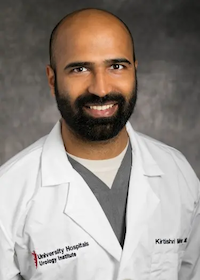Article
University Hospitals to host upcoming course in transgender care
Author(s):
"The thing that's unique about this course, in my opinion, is that we are combining the vaginoplasty and phalloplasty discussions," says Kirtishri Mishra, MD.
In this interview, Kirtishri Mishra, MD, highlights an upcoming University Hospitals-sponsored course titled, “Masculinizing & Feminizing Gender Affirming Surgery: A Comprehensive Course,” which will take place on September 29-30, 2023. Mishra is a reconstructive urologist at University Hospitals and MetroHealth in Cleveland, Ohio.
Kirtishri Mishra, MD

Could you provide some background on transgender care?
Transgender care is something that [has been] evolving on a more macro level in our society since the reforms in the mid 2010s. Transgender care, definitely for the better, has become more accessible to patients. Prior to that, we have had stories of patients getting their hormones and surgeries in areas that perhaps are not the most reputable. Since then, overall, as a field, we have done an amazing job of advancing care and making this a priority within urology.
Urologists are integral to the care for transgender patients, because a lot of times the bottom transition, meaning specific to their genitalia, is the last thing that most patients will pursue. But it also happens to be one of the more complex surgeries that they may undergo. It's important that us as urologists are part of this discipline, because you're going to get called about it whether you want to or not. It’s important that you have some familiarity with the anatomy, as far as its reconfigured, as well as how to deal with the complications when they do happen. Ideally, the patient is close enough to where they have their initial surgery, and at least for that acute period, I ask my patients to stay within a 60-minute radius for the next 3 weeks. But at the end of the day, complications do happen, and they may not be acute, they may be sub-acute, they may be much later than that. So, it's important that urologists are familiar with this.
Could you provide an overview of your upcoming symposium, “Masculinizing & Feminizing Gender Affirming Surgery: A Comprehensive Course”?
Overall, from a 10,000 feet perspective, education has always been an important thing that I value as far as working with medical students and other attendees, and so on. This course is our effort to disseminate the knowledge that we have garnered over our time here at University Hospitals and Case Western Reserve University Urology. We want to share that. We want to make this information available to people where they can have a discourse with course faculty members, and so on. So that's the major thing that we're trying to push for with this course.
Specifically, what we're trying to accomplish in this course is educate not just surgeons, but also people who are on the more clinical side of it, whether it be advanced practice providers or even residents and trainees on the fellow level. We just want people to acknowledge that there is this evolving discipline that requires a lot of sub specialized knowledge. We don't expect everyone to be an expert in this. We expect people to understand what the reconfigured anatomy might be, and subsequently, if they don't feel comfortable managing it, and hopefully after the course they do, but if they don't, then they know what their limitations are. One of the things that we try to look out for is that we want to empower the local communities to be able to provide at least a certain amount of care, and past that they should refer. But it's just the devil’s in the details, and sometimes that gets missed if you just expect any general urologists to be able to tackle this kind of care.
What are you hoping that urologists and other attendees gain from this course?
What we hope that people will gain from this course is the ability to go from building a program to managing some complex complications from surgery. All of that comes with a very longitudinal plan as far as allowing people to be able to provide care to transgender patients. Specifically, we will start the course with an overview of what the criteria for some of these surgeries are and how patients can pursue it. It will start at a very dogmatic level of "This is how we do it. This is what's always been said,” and so on. But then we'll evolve more through the research that's been done and how can we progress the field.
In the middle, we will have a multi-disciplinary perspective from sexual health providers, psychotherapists, and behavioral health therapists [and] we'll have our surgeons from a urology and plastic surgery perspective. The thing that's unique about this course, in my opinion, is that we are combining the vaginoplasty and phalloplasty discussions. We’re having providers fly in from around the country who are well known experts in this domain. We want people [to be able to] attend this 2-day course and have a good grasp on vaginoplasty, or the feminizing side of things, as well as the masculinizing and phalloplasty side of things. I think this is one of those unique courses where you also get a chance to take that Socratic learning that you’re experiencing the first half of the day, and transpose it onto a cadaver. Both days, we'll have a cadaver lab where the trainees and the participants will have a chance to do some of this dissection on their own with an attending there.
Who might be interested in attending?
The course is designed to be really holistic. It's designed from the consideration of building a course from a business perspective. So, we have a couple of people who are talking about how to justify, on a dollar perspective, building this type of course, which I think from a provider's perspective, we don't get enough education on that.
We have some people who are interested in the business side who want to attend this, but even if they're not there, it's important for doctors and medical providers to be empowered to understand [things like] how many [relative value units] do I generate for a surgery like this? How do I leverage my institution to allow me to do the surgery? Because it is a major undertaking. The gamut is the full spectrum, so it may be someone who is interested in business to somebody who is on the other side and they only do bottom surgery, and everything in between. Meaning that we want behavioral health therapists to be there, we want social workers to be there, we want advanced practice providers to be there, and we want general urologists to be there who actually, in their local communities, may come across some of these patients. We are very open to essentially, within the moment, tailoring the course to entertain questions. Within the scope of what we're teaching, if somebody has a question, we will entertain that during the cadaver course and so on. So, I think in all regards, we welcome everybody.
Is there anything else that you’d like to add?
I'd like to hammer home the point that this is not just a vaginoplasty or a phalloplasty course; it's all of it together. The fact [is] that it encompasses the full spectrum of care starting with building the practice and so on, because I think that is something that a lot of new providers struggle with.
You can learn more about the event here.
Newsletter
Stay current with the latest urology news and practice-changing insights — sign up now for the essential updates every urologist needs.
















